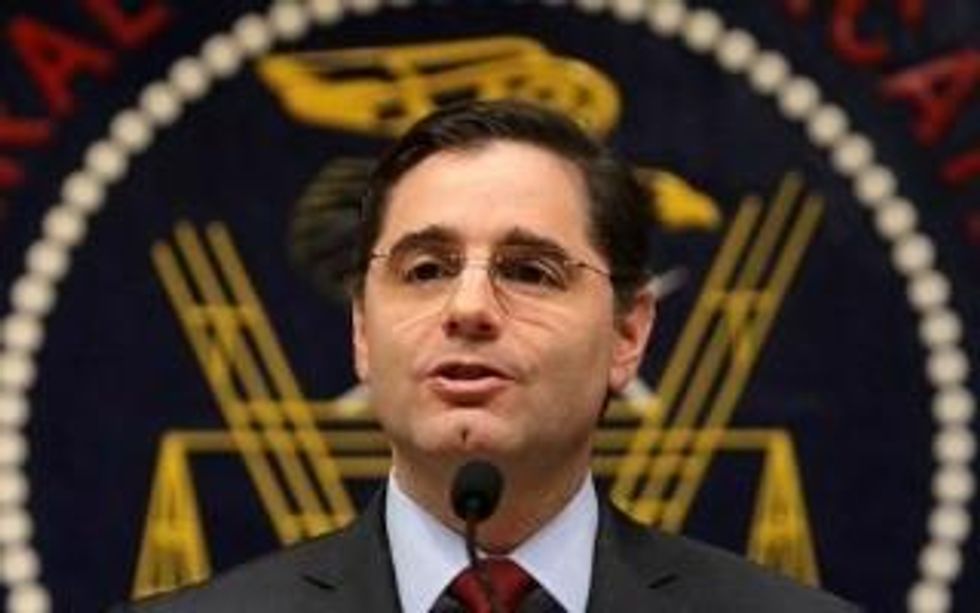In a communications landscape where everything is up for grabs, the most powerful--and self-serving--players are grabbing for everything. And decisions that President Obama and his next appointee to chair the Federal Communications Commission will make in the coming months could well decide whether new media robber barons will dominate the local, state and national discourse.
Rupert Murdoch has renewed his push to have the FCC scrap its thirty-eight-year-old media cross-ownership rule, which bars him from buying up the daily newspaper, the largest television and radio stations, and the top digital news and entertainment sites in major American cities. Murdoch wants to rule the roost in Los Angeles, where he already owns TV stations and is salivating at the prospect of combining them with the Los Angeles Times, the nation's fourth-largest newspaper, which the Tribune Company is putting up for sale.
If the FCC clears the way for greater media consolidation, Murdoch could face competition from even more ambitious players, including the Koch brothers. LA Weekly reports that the billionaire funders of right-wing campaigns might begin backing up their political projects with purchases from a Tribune stable that includes the largest newspapers in California, Illinois, Connecticut and Maryland, as well as media properties in battleground states like Florida and Virginia.
Newspapers no longer make the kind of money they once did, but as the American Journalism Review notes, there are buyers who get excited by a "Citizen Kane model of using the paper's news columns to promote a point of view." And if the FCC scraps its cross-ownership rule, the "Citizen Kane model" won't be restricted to traditional news columns. For evidence of that, look to San Diego, where developer Doug Manchester has, since he purchased the powerful Union-Tribune, stirred an outcry by turning the paper (and its popular website) into a cheerleader for his projects, proposals and candidates. Even if the media buyers are not heavy-handed right-wingers, rule changes that would allow billionaires to use old-media newsrooms as one-size-fits-all "content providers" for broadcast outlets and heavily trafficked new-media sites should be rejected, in the words of Free Press president Craig Aaron, as "unfathomable at a moment when the airwaves are already so consolidated, so concentrated, and simply don't represent the diversity, and the diversity of viewpoints, of the American people."
Why are we even debating such rule changes when a Democratic president's appointees should be defining the FCC as a public interest agency? Because Obama's first commission chair, Julius Genachowski, renewed some of the worst proposals from the Bush/Cheney era, when millions of Americans organized to fight for media diversity. "I thought we would have made some changes, beginning in 2009, to reverse the ongoing trend toward media consolidation," says former FCC commissioner Michael Copps. Instead, he suggests, "we haven't tightened the rules. We haven't done anything about media consolidation. And the situation gets worse and worse, and the consolidation goes on and on."
Those aren't the only places where Genachowski got it wrong. Groups like Color of Change spent much of his term battling to realize the promise of the Internet for all Americans. Yet Genachowski's FCC failed to make broadband affordable and accessible to communities on the losing end of a yawning digital divide, and it enacted only toothless
protections for network neutrality, which keeps the Internet open and competitive while preventing corporate gatekeepers from making Americans pay for access to the national discourse.
Advocates of media diversity have a dream pick for Genachowski's replacement as chair: Benjamin N. Cardozo School of Law professor Susan Crawford (who served briefly as Obama's special assistant for science, technology and innovation policy, and whose new book on the telecom industry Copps discusses on page 21). But the president has plenty of other prospects who "get it." Unfortunately, there are reports that Obama--who knows it will be difficult to win Senate approval for a bold pick-- could select a telecom-tied chair who talks the citizen talk but walks the corporate walk. Media activists, who gather April 5-7 in Denver for the fifth National Conference for Media Reform, will work to make sure that doesn't happen.
The FCC should not be a tool of the industries and political insiders who already call too many shots in Washington. It should be a bold agency that fights media consolidation, protects net neutrality, expands access to high-quality Internet at little or no cost to the people who need it most and--as Copps has suggested in these pages (see "Sunshine on Dark Money," February 25)--enforces existing rules that require attack-ad funders to put their names in these commercials, which so diminish our democratic discourse. President Obama has an opportunity to renew the promise of the FCC's New Deal-era founding: to make it an agency that promotes diversity and democracy, that listens less to Rupert Murdoch and old-media moguls and more to the champions of a multimedia future that provides Americans with what an open society requires. We should all demand that he seize it.




